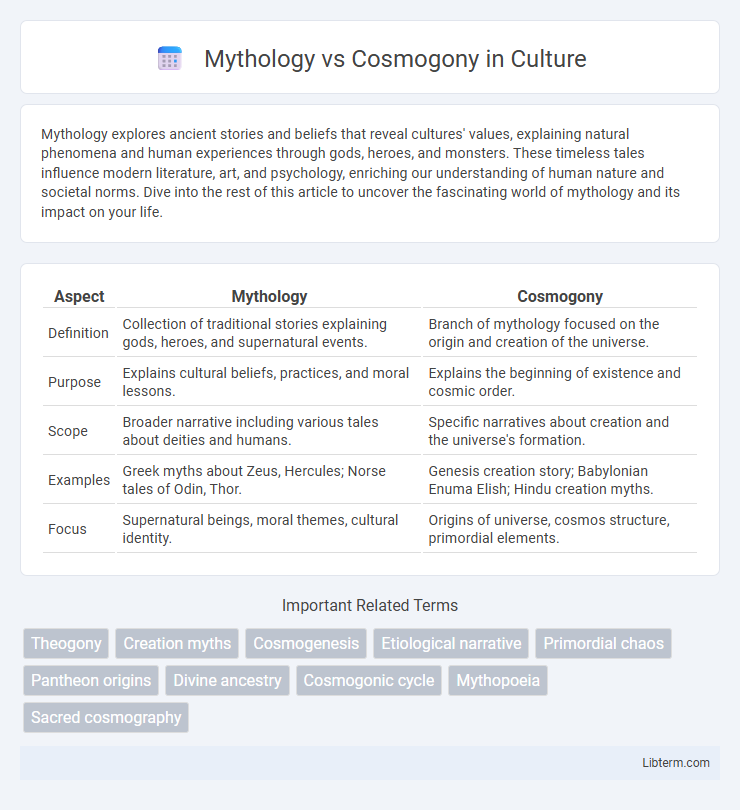Mythology explores ancient stories and beliefs that reveal cultures' values, explaining natural phenomena and human experiences through gods, heroes, and monsters. These timeless tales influence modern literature, art, and psychology, enriching our understanding of human nature and societal norms. Dive into the rest of this article to uncover the fascinating world of mythology and its impact on your life.
Table of Comparison
| Aspect | Mythology | Cosmogony |
|---|---|---|
| Definition | Collection of traditional stories explaining gods, heroes, and supernatural events. | Branch of mythology focused on the origin and creation of the universe. |
| Purpose | Explains cultural beliefs, practices, and moral lessons. | Explains the beginning of existence and cosmic order. |
| Scope | Broader narrative including various tales about deities and humans. | Specific narratives about creation and the universe's formation. |
| Examples | Greek myths about Zeus, Hercules; Norse tales of Odin, Thor. | Genesis creation story; Babylonian Enuma Elish; Hindu creation myths. |
| Focus | Supernatural beings, moral themes, cultural identity. | Origins of universe, cosmos structure, primordial elements. |
Defining Mythology and Cosmogony
Mythology comprises a collection of traditional stories and legends that explain natural phenomena, human behavior, and cultural practices through symbolic narratives involving gods, heroes, and supernatural beings. Cosmogony specifically refers to theories or myths concerning the origin and creation of the universe or cosmos, detailing how existence and order emerged from chaos. While mythology broadly encompasses diverse narratives explaining various aspects of life and the cosmos, cosmogony is focused solely on the beginnings and formation of the world.
Origins: Mythological Tales vs Cosmogonic Narratives
Mythology encompasses mythological tales that explain origins through symbolic stories involving gods, heroes, and supernatural events, reflecting cultural values and beliefs. Cosmogony, as a scientific and philosophical study, presents cosmogonic narratives focused on the origins of the universe based on cosmic phenomena, physical laws, and empirical observations. These narratives often contrast mythological explanations by emphasizing evidence-based accounts of creation, such as the Big Bang theory and cosmic evolution.
Purpose and Function in Ancient Societies
Mythology served to explain cultural values, moral lessons, and the origins of gods and heroes, reinforcing social norms and community identity in ancient societies. Cosmogony focused specifically on explaining the creation of the universe, providing a structured narrative for the origins of existence and the cosmos. Both functions helped ancient cultures understand their place in the world while legitimizing authority and ritual practices.
Cosmological Structures: Patterns and Archetypes
Mythology presents cosmological structures through symbolic narratives and archetypal themes that explain the universe's origins and order, often featuring gods, heroes, and cosmic battles. Cosmogony, rooted in scientific inquiry, charts the physical formation of the universe, emphasizing patterns like cosmic inflation, galaxy formation, and fundamental forces. Both frameworks reveal recurring motifs such as chaos to order transitions and dualities, underscoring humanity's search for meaning in cosmic patterns and structures.
Creation Myths Across Cultures
Creation myths across cultures reveal diverse cosmogonies that explain the universe's origins through symbolic narratives. Mythology often incorporates gods, primordial elements, and cosmic events to convey how existence emerged, reflecting cultural values and worldviews. These stories provide insights into human understanding of creation, blending metaphysical concepts with historical traditions.
Divine Beings and the Origin of the Universe
Mythology often centers on divine beings as personified gods and goddesses who influence human fate and natural phenomena, whereas cosmogony specifically explores the origin of the universe, detailing primordial forces or entities responsible for creation. Divine beings in mythologies, such as Zeus in Greek tales or Odin in Norse lore, embody specific powers and narratives that explain natural and moral order. Cosmogonic myths, like the Babylonian Enuma Elish or the Hindu Rigveda, describe the emergence of cosmos from chaos, highlighting creation as a foundational event shaped by divine or cosmic principles.
Symbolism in Mythology vs Cosmogony
Symbolism in mythology often conveys moral lessons, cultural values, and human experiences through archetypal figures and narratives, while cosmogony employs symbolic representation to explain the origins of the universe and natural phenomena. Mythological symbols typically embody gods, heroes, and creatures that personify abstract concepts, whereas cosmogonic symbols frequently depict primordial chaos, creation elements, and cosmic order. The symbolic language in mythology is layered with metaphorical meanings guiding social conduct, contrasting with cosmogony's focus on existential beginnings and the structuring of reality.
Influence on Religion and Worldview
Mythology shapes religion by providing symbolic stories that explain divine actions, moral values, and human experiences, deeply influencing cultural rituals and belief systems. Cosmogony offers a structured explanation of the universe's origins, framing existential questions that underpin religious doctrines and cosmological views. Together, they forge foundational narratives that guide worldviews, integrating the sacred with human understanding of existence and creation.
Modern Interpretations and Relevance
Modern interpretations of mythology often emphasize symbolic narratives that reflect cultural values and psychological archetypes, while cosmogony is studied as scientific and philosophical explanations of the universe's origins. Contemporary scholars integrate mythological themes with cosmological findings to explore humanity's enduring quest for meaning and existence. This interdisciplinary approach highlights mythology's continued relevance in understanding identity and cosmological structure in present-day society.
Comparative Analysis: Mythology vs Cosmogony
Mythology encompasses a broad collection of traditional stories and legends explaining natural phenomena, cultural practices, and human experiences. Cosmogony specifically addresses the origin and creation of the universe, often found within mythological frameworks, but distinct in its focus on cosmological beginnings. Comparative analysis reveals that while mythology serves as a cultural narrative repository, cosmogony functions as a structured account of the universe's genesis, integrating scientific, religious, and philosophical elements.
Mythology Infographic

 libterm.com
libterm.com